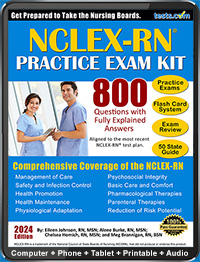2024 Edition
NCLEX-RN Certification Test
A Free NCLEX-RN Practice Exam...
To become a certified or licensed registered nurse, you will have to take the NCLEX-RN.
The actual NCLEX exam includes these categories: Basic Nursing Care, Management and Practice Directives, Preventing Risks and Complications, Caring for Acute and Chronic Conditions, Safety, Mental Health, Pharmacology and Growth and Development.
To prepare for your RN licensure exam, see the complete Practice Exam for the NCLEX-RN with 750 questions, written by nursing experts and medical writers.
Take this free practice exam to get a sample of the types of questions that are on the NCLEX-RN exam.
Quality starts with who wrote the material.
Our practice exam writer
s
:
Eileen Johnson, RN, MSN
Alene Burke, RN, MSN
Chelsea Homich, RN, MSN
Meg Brannagan, RN, BSN
Alene Burke, RN, MSN
Chelsea Homich, RN, MSN
Meg Brannagan, RN, BSN




